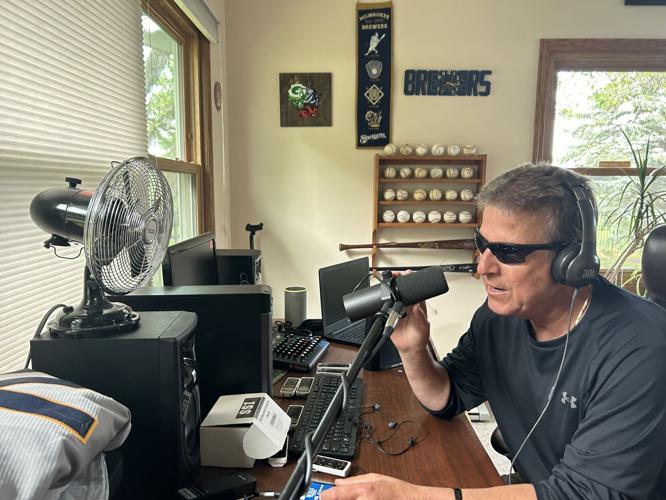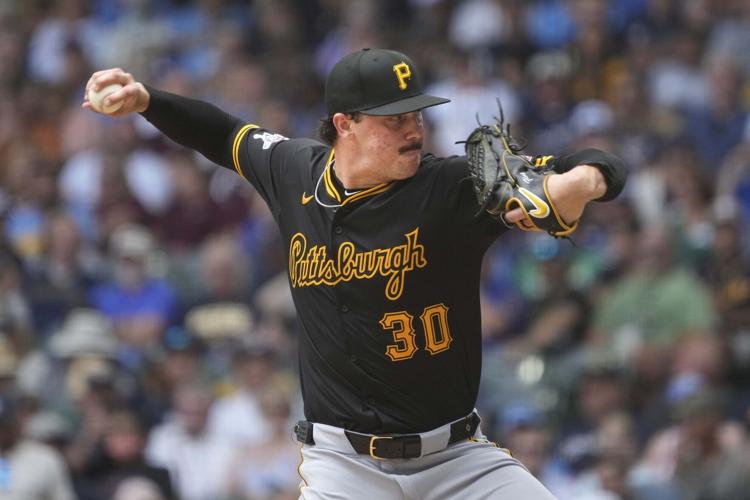KENOSHA — It’s a Thursday afternoon, and Tim Allen is in his happy place. The sunroom he’s sitting in is a two-step drop from his adjacent living room and serves two purposes, both of which bring him great joy.
To the right: An impressive display of toys in a play area for the three kids he considers his grandchildren.
To the left: A makeshift home studio containing equipment that allows Allen, who’s been in radio for more than 3½ decades and has been a fixture on a baseball postgame show for the past 19 years, to broadcast remotely. Scattered throughout the room are various pieces of memorabilia, including baseballs, bats and bobbleheads.
This is where Allen will spend the majority of that day’s 2-hour, 20-minute game between the Milwaukee Brewers and Pittsburgh Pirates taking place 38 miles up the road at American Family Field.
People are also reading…
A microphone processor and remote broadcast unit rest on the desk where Allen is seated 45 minutes before first pitch while doing a hit on the “The Mike Heller Show.”
As usual, Heller and his colleague cover a lot of ground over the course of a 20-minute interview. The topic du jour is Paul Skenes, the 22-year-old wunderkind pitching that day for the Pirates. While slightly annoyed by all the attention Skenes has been getting all week, it’s clear that Allen respects the rookie right-hander and understands while there’s a buzz heading into the final game of a three-game set between the National League Central rivals.
Allen even describes it to Heller as a must-see event, a choice of words that catches my attention. Because, while he will spend the next 140 minutes monitoring every at-bat of a game in which Skenes lives up to the hype and then some, Allen won’t actually see a single play from it.

Tim Allen, who has done a baseball postgame radio show for nearly two decades, breaks down the Brewers' 1-0 home loss to Pittsburgh on July 11.
How Tim Allen fell in love with baseball
It was 1972 and Allen, a Kenosha native, was filing into Milwaukee County Stadium with the other members of his Cub Scouts troop.
Some of them no doubt had attended a Brewers game by that point in their lives. For Allen, this was his first trip.
As first impressions go, the young boy was unmoved. Allen remembers staring at a bunch of concrete while slowly making his way up the ramps to the upper deck. His perspective changed completely once he finally emerged through a tunnel and got his first look at the inside of the ballpark.
“I could not believe how colorful it was,” Allen said, describing that experience as if it were yesterday, not 50 years ago. “The grass was so green. The white lines were chalked. It was so vivid and sharp. It was like watching ‘Wizard of Oz’ when they went from black and white to color.”
Allen spent so much time gazing at the beautiful setting that an usher had to tell him to move on because he was blocking traffic lined up in the tunnel. That moment is, without a doubt, when he became a Brewers fan for life.

A setting sun glints off empty seats in Milwaukee County Stadium on Sept. 14, 1994 as the baseball strike ends its 34th day. It's the same venue in which Brewers broadcaster Tim Allen, who has since lost his vision, fell in love with baseball.
He’d eventually return to County Stadium, only this time with a 35mm camera that he’d purchased for $5 at a rummage sale. While his father remained in their seats enjoying a beer and some peanuts, Allen would work his way down to the bright red seats closer to the field and snapped pictures of Hank Aaron in the on-deck circle, ushers ignoring his excursion to the more expensive seating area most of the time because he wasn’t bothering anybody.
It was a kid who clearly loved baseball and the Brewers, a kid hooked on an image that would be locked in his memory forever and brings him pleasure to this day.
“I don’t need to ever see it again,” Allen says now. “I saw it, and it was awesome.”
How Tim Allen realized he was losing his vision
His baseball addiction was in full force years later when Allen would hop on his bike, glove resting on his handlebars, and join his buddies at a Kenosha diamond for games that lasted hours.
What Allen couldn’t help but notice — but wouldn’t admit to his friends — was that he was always the first one to begin having trouble tracking fly balls at dusk. He adapted, as would become a theme in his life, by making frequent trips to the local sporting goods store and showing up with brand new baseballs that were so much easier to spot the darker it got.
It wasn’t until Allen’s late teens that it had become obvious that his eyesight was deteriorating. An eye doctor referred the family to a specialist in Madison who, after further testing, diagnosed Allen with retinitis pigmentosa, a rare genetic disease that affects the light-sensitive layer of tissue in the back of the eye. The condition, known as RP, causes cells in the retina to break down slowly over time, eventually causing vision loss.
Allen was told he’d eventually lose most, if not all, of his sight, likely within 20 years.
“But I didn’t really believe it,” he said.
How being creative has helped Tim Allen thrive in radio
It’s been roughly 40 years since that diagnosis, and Allen, now 59, says his vision is extremely limited.
“I don’t rely on it for anything,” said Allen, who wears sunglasses everywhere he goes, shrugging off occasional jeers of “Joe Cool” when he walks into an establishment. “Once you cross over to that understanding, it gets a lot easier.”
It became clear early in our conversation that Allen, who was somewhat reluctant to participate in this story in the first place, doesn’t feel sorry for himself. In fact, he referred to himself as lucky on multiple occasions, and for different reasons.
How Allen ended up in the radio business belongs in that bin of why he feels blessed. He initially attended Madison Area Technical College out of Kenosha Bradford High School, majoring in general studies and even competing on the bowling team, but finished school without a purpose or direction.
Allen doesn’t consider himself super religious, but his search for answers led him to kneel down and pray for guidance one night. The next day, while practicing with the band he was playing in at the time, Allen was messing around on the microphone and sounded good enough that another member of the group, who worked part-time at Z104 in Madison, recommended a career in radio.
The idea sounded appealing, so Allen returned to his hometown and went back to school while pursuing a degree in radio broadcasting at Gateway Technical College’s Kenosha campus, where years later he’d serve as an adjunct professor in the same program for eight years.
Radio is a tough business, but Allen has survived in it for 36 years while fulfilling various roles. He had a full-time job as the program director at a country music station at one point while filling a part-time job hosting a sports show on the weekend, just one example of the type of grinding he’s been willing to perform during a remarkable run of longevity.
There was reluctance at first to even enter a profession in which, he worried, his deteriorating eyesight would prove to be too big of an obstacle to come down the road. Just like the young baseball player adjusted to the darkening sky by buying brighter baseballs, the adult disc jockey hit bold on the copy machine when he was printing out his four-hour musical set or used a sharpie to write out advertising copy on a 3x5 index card.
“You just got creative,” Allen said, “and you found a way.”
How a ‘never-quit’ attitude helped Tim Allen raise his son
But how does a visually impaired father raise a child on his own, a position Allen found himself in before his son, Ty, had even reached double digits in age?
“In the moment as a kid growing up there was never anything that I didn’t do or couldn’t do with my dad that made it different than the kid next door,” Ty said. “It was all the same to me.”
In other words, Allen got creative as a father. He found a way. The son who eventually ended up playing Division I baseball still got to play ball with his father in the backyard while growing up, experiencing bonding moments in ways that weren’t conventional but were meaningful nonetheless.
“We came up with ways to get around that stuff,” Ty said. “He would still pitch to me in the backyard. I would still pitch to him, funny enough, and he would actually have some success.”
What always amazed Ty was how much feedback his father could offer from games he attended but couldn’t actually see. What he’d learn along the way was that Allen could tell whether his son had thrown a fastball or a curveball based on the sound the pitch made when it hit the glove. He could tell where a ball was hit by the sound of it hitting the bat.
All the things that go along with growing up — getting married, buying a house, etc. — have made Ty appreciate his father even more for the job he did as a single parent with impaired vision.
“He’s been dealt some cards that aren’t the best, that aren’t going to lead to a winning hand every time,” Ty said. “But the dedication and the scratch-and-law and never-quit (attitude) has got him to where he’s at today.”
Why Tim Allen embraced being a postgame host
There was only one what-if scenario that Allen verbalized during the three hours I spent with him last week. Again, this isn’t a man who dwells on the negatives.
But he did admit during a moment of reflection how losing his sight has cost him a chance to do something he’d love to try and almost certainly would be good at: Play-by-play announcing in baseball.
The next best thing, as far as he’s concerned, has been finding a voice — and developing a large following — while doing a baseball postgame show following Brewers games on various platforms for nearly two decades.
Allen started the show with longtime friend Steve “Sparky” Fifer, a fixture on Milwaukee-area radio stations for years. They presented an idea for the show to their boss in 2005 and were told it didn’t stand a chance. Allen asked for a year trial and said he’d do it for barely any compensation.
Nineteen years later, it’s still going strong. Allen does about 150 postgame shows a year — plus a season-in-review show when the offseason arrives — and reached the 2,500-show mark in his career last September.
“He’s had opportunities to host daily shows,” Fifer said. “But he wants to do that postgame show more than anything else because that’s his first true love.”
Along the way, Allen has taken up-and-comers such as Fifer and Bill Schmid under his wing.
Schmid grew up listening to Allen and, like Fifer, co-hosted the postgame show with him. Now part of the regular iHeart rotation in Wisconsin while co-hosting a daily morning show, Schmid said Allen’s approach to the postgame show helped prepare him for his current role as a postgame host for University of Wisconsin football and the Green Bay Packers.
Allen’s philosophy is simple: Prepare as if you’re doing a normal talk show because that material may be needed if the game is a snoozer and callers want to focus on big-picture topics instead.
“The postgame sometimes is a castoff job in radio,” Schmid said, “and he’s taken it as his career and turned it into something completely different.”
How Tim Allen experiences a Brewers game
Schmid admits he got off on the wrong foot with Allen, mainly because he arrived to watch a Brewers game armed with takes on the team that he’d been sitting on for years. He wanted to impress a man whose reputation was respected around the business.
One problem: Allen didn’t have time for chatter because he needed to pay attention to the game. For Allen, that experience includes listening to the radio and TV broadcasts simultaneously while speaking into a digital recorder each inning as a way of taking notes.
Allen later will listen to these recordings — along with prerecorded ad reads — through an earpiece that is under his headphones. What’s happening is hard to describe and, as Fifer can attest after trying it years ago, difficult to replicate: Imagine listening to a recording of yourself saying something and repeating it in real time, beginning a split-second after pushing the play button so you can hear yourself while still speaking.
“It’s very difficult to do what he does,” Fifer said.
While I was watching the Pirates’ 1-0 win over the Brewers play out on a big screen in Allen’s living room, he was visualizing what was happening while listening to the likes of Bob Uecker and Jeff Levering.
When Uecker describes a ball hit to the hole that Brewers shortstop Willy Adames picks, plants and throws for an out at first base, Allen doesn’t need to know what Adames looks like to make that visualization complete: He pictures Robin Yount doing it after watching the Milwaukee legend make that play over and over back before Allen’s sight had disappeared.
“And that’s where the luckiness comes in,” Allen said. “I’ve seen it. It doesn’t change.”
That I’m visiting Allen on a day in which a potential generational pitcher is on the mound for the opponent brings me to another question for him: Does he try to picture what Skenes looks like?
The answer is yes, and it’s one example of Allen seeking context to help make that picture in his mind clearer. Skenes’ height and weight give Allen a good idea of build. He’s done research on pitch velocity. He’ll even ask his girlfriend for identifying characteristics; in this case, Skenes’ mustache stands out.

Pirates phenom Paul Skenes pitched seven no-hit innings against the Brewers on July 11. Postgame radio host Tim Allen, who lost his vision, tries to picture what Skenes and others look like.
It’s possible — likely, even — that some in Allen’s audience may not know about his condition. He doesn’t advertise it, doesn’t believe it’s relevant and does his best to make sure he’s ready when asked to give his opinion on something everyone else has seen.
Case in point: A ball down the line that is called foul or, as the case may be, called fair. Allen will ask his girlfriend, a big baseball fan, her opinion if she’s watching. He’ll reach out to Ty. He’ll ask a producer, maybe even a co-worker. By the time the question is asked on the postgame show, Allen will have a consensus of whether or not the umpire made the right call and can give an informed opinion.
“It’s a little different, I’ll grant you that,” Allen said. “But you customize a way to get from Point A to Point B. You customize it to you.”
Why Tim Allen is a ‘fan first’
Allen has had four main bosses during his long run doing the postgame show, and each of them have gotten some version of the same speech from him: He’s happy to entertain any of their requests because he’s a team player, but Allen makes it clear he has to be a fan first and a broadcaster second.
“I am my listener,” he said. “The only difference is that I’ve got a background in radio and I’ve got to do certain things like read commercials. There’s no other difference. They work, I work, we love the Brewers.”
Sure enough, watching a game with Allen is somewhat like watching it while seated next to Joe or Jane Fan at American Family Field.
He praises Brewers starter Aaron Civale for a strikeout in the first inning, begs the Brewers to “put up a crooked number here and steal this thing” after Skenes exits with a 1-0 lead after not allowing a hit through seven innings, and claps when Milwaukee ends the no-hit bid in the eighth.
“We ain’t getting no hit today,” he said.
Allen’s audience — the Postgamers — includes a mix of regular callers. There’s Beer Count Kenny, Bill in Iron River, Justin in North Carolina, One More Thing Johnny and more.
He considers them family. They love Allen, and he loves them.
“The thing that makes him special is his ability to connect with the fans,” Fifer said. “When he’s mad, more than likely every fan listening to him is just as mad and appreciates him being mad about something. And when he gets excited and is clapping his hands and going crazy, those fans are probably generally excited, too. His dislike for the Cubs and the Cardinals, fans all can kind of relate to that because they’re all in that same boat.”
Allen’s homerism includes referring to Craig Counsell, who left the Brewers last offseason to take over the Cubs’ managerial role, as “that other guy.” He’s already declared this Brewers campaign “the 2024 championship season.”
What Allen has been missing this season, and has since 2019, is actual trips to the ballpark. His second bout with COVID-19 hit the day after Christmas in 2021, and he’s been dealing with lingering symptoms such as fatigue and lack of balance ever since.
Being visually impaired? That’s not a big deal from his perspective, Allen will tell you. But long COVID? Allen is here to attest that it’s real, and he seemed wiped out and ready for a nap as his postgame wrapup show, abbreviated because it was an afternoon game, came to a close on the day I visited his home.
But Allen has no plans to slow down anytime soon. He plays in two bands. He has a goal of reaching 3,000 postgame shows, a fitting total considering how that number is cherished in baseball circles. And he hopes to feel well enough to make his triumphant return to watch a Brewers home game as early as August.
“I can’t get much better than this,” Allen said. “I’m not going to say I’ve got it made, but gosh darn it, I’m in a pretty good spot.”
Brewers offense firing on all cylinders thanks in part to barrage of grand slams

Milwaukee's Jake Bauers hits a grand slam during the eighth inning of the Brewers' 8-6 loss to the Pittsburgh Pirates on May 13 in Milwaukee. It was the first career grand slam for Bauers, who sent a 3-2 sinker from Pirates reliever Josh Fleming over the right-field wall.

Milwaukee's Jake Bauers hits a grand slam during the eighth inning of the Brewers' 8-6 loss to the Pittsburgh Pirates on May 13 in Milwaukee.

Milwaukee's Jake Bauers hits a grand slam during the eighth inning of the Brewers' 8-6 loss to the Pittsburgh Pirates on May 13 in Milwaukee.

Milwaukee's Jake Bauers rounds the bases after hitting a grand slam during the eighth inning of the Brewers' 8-6 loss to the Pittsburgh Pirates on May 13 in Milwaukee.

Milwaukee's Brice Turang, right, celebrates with third base coach Jason Lane after hitting a grand slam during the ninth inning of the Brewers' 6-4 loss to the San Diego Padres on June 22 in San Diego. Milwaukee was scoreless and facing its final out when Turang took Padres reliever Jhony Brito deep to left for his second career grand slam.

Milwaukee's Brice Turang, right, celebrates with teammate Rhys Hoskins after hitting a grand slam during the ninth inning of the Brewers' 6-4 loss to the San Diego Padres on June 22 in San Diego.

Milwaukee's Rhys Hoskins hits a grand slam during the sixth inning of the Brewers' 6-3 win over the Texas Rangers on June 24 in Milwaukee. Hoskins put Milwaukee ahead for good by driving a first-pitch fastball from Rangers reliever Jacob Latz into the left-field seats for his third career grand slam, which was part of a five-run rally in the sixth.

Milwaukee's Rhys Hoskins reacts after hitting a grand slam during the sixth inning of the Brewers' 6-3 win over the Texas Rangers on June 24 in Milwaukee.

Milwaukee's Rhys Hoskins reacts after hitting a grand slam during the sixth inning of the Brewers' 6-3 win over the Texas Rangers on June 24 in Milwaukee.

Milwaukee's Rhys Hoskins reacts as he crosses the plate after hitting a grand slam during the sixth inning of the Brewers' 6-3 win over the Texas Rangers on June 24 in Milwaukee.

Milwaukee's Rhys Hoskins is congratulated after hitting a grand slam during the sixth inning of the Brewers' 6-3 win over the Texas Rangers on June 24 in Milwaukee.

Milwaukee's Jake Bauers hits a grand slam during the third inning of the Brewers' 6-5 win over the Texas Rangers in 10 innings on June 26 in Milwaukee. Bauers homered off Texas starter Nathan Eovaldi with two down to give Milwaukee a 4-1 lead with a 444-foot drive to center field for his second career grand slam and second of the season.

Milwaukee's Jake Bauers tosses his bat after hitting a grand slam during the third inning of the Brewers' 6-5 win over the Texas Rangers in 10 innings on June 26 in Milwaukee.

Milwaukee's Jake Bauers rounds the bases after hitting a grand slam during the third inning of the Brewers' 6-5 win over the Texas Rangers in 10 innings on June 26 in Milwaukee.

Milwaukee's Jake Bauers is congratulated by Christian Yelich and Jackson Chourio after hitting a grand slam during the third inning of the Brewers' 6-5 win over the Texas Rangers in 10 innings on June 26 in Milwaukee.

Milwaukee's Jake Bauers celebrates with teammates after hitting a grand slam during the third inning of the Brewers' 6-5 win over the Texas Rangers in 10 innings on June 26 in Milwaukee.

Milwaukee's Jackson Chourio hits a grand slam during the fourth inning of the Brewers' 4-2 win over the Chicago Cubs on June 28 in Milwaukee. The 20-year-old rookie became the youngest player in franchise history to hit a grand slam, recording the first of his career on a 1-2 sweeper off Cubs starter Jameson Taillon with two outs after the ball just made it over the wall in left and put the Brewers ahead 4-2 for good.

Milwaukee's Jackson Chourio hits a grand slam during the fourth inning of the Brewers' 4-2 win over the Chicago Cubs on June 28 in Milwaukee.

Chicago's Ian Happ can't catch a grand slam hit by Milwaukee's Jackson Chourio during the fourth inning of the Brewers' 4-2 win over the Cubs on June 28 in Milwaukee.

Milwaukee's Jackson Chourio rounds the bases after hitting a grand slam during the fourth inning of the Brewers' 4-2 win over the Chicago Cubs on June 28 in Milwaukee.

Milwaukee's Jackson Chourio reacts after hitting a grand slam during the fourth inning of the Brewers' 4-2 win over the Chicago Cubs on June 28 in Milwaukee.

Milwaukee's Jackson Chourio celebrates with teammates after hitting a grand slam during the fourth inning of the Brewers' 4-2 win over the Chicago Cubs on June 28 in Milwaukee.

Milwaukee's Brice Turang hits a grand slam during the fourth inning of the Brewers' 7-1 win over the Chicago Cubs on June 30 in Milwaukee. Turang's two-out blast to right field was his second grand slam in last five games and Milwaukee's fifth in eight games and sixth on the season.

Milwaukee's Brice Turang hits a grand slam during the fourth inning of the Brewers' 7-1 win over the Chicago Cubs on June 30 in Milwaukee.

Milwaukee's Brice Turang tosses his bat after hitting a grand slam during the fourth inning of the Brewers' 7-1 win over the Chicago Cubs on June 30 in Milwaukee.

Milwaukee's Brice Turang celebrates with teammates after hitting a grand slam during the fourth inning of the Brewers' 7-1 win over the Chicago Cubs on June 30 in Milwaukee.

Milwaukee's Rhys Hoskins hits a grand slam during the fourth inning of the Brewers' 8-5 loss to the Los Angeles Dodgers on July 5 in Los Angeles. It was the second grand slam of the year for Hoskins and the seventh of the season for the Brewers.

Milwaukee's Rhys Hoskins hits a grand slam off Los Angeles Dodgers starting pitcher Tyler Glasnow during the fourth inning of the Brewers' 8-5 loss to the Los Angeles Dodgers on July 5 in Los Angeles.

Milwaukee's Rhys Hoskins rounds the bases after hitting a grand slam off Los Angeles Dodgers starting pitcher Tyler Glasnow during the fourth inning of the Brewers' 8-5 loss to the Los Angeles Dodgers on July 5 in Los Angeles.

Milwaukee's Rhys Hoskins, center, is congratulated by his Brewers teammates after hitting a grand slam during the fourth inning of the Brewers' 8-5 loss to the Los Angeles Dodgers on July 5 in Los Angeles.



















